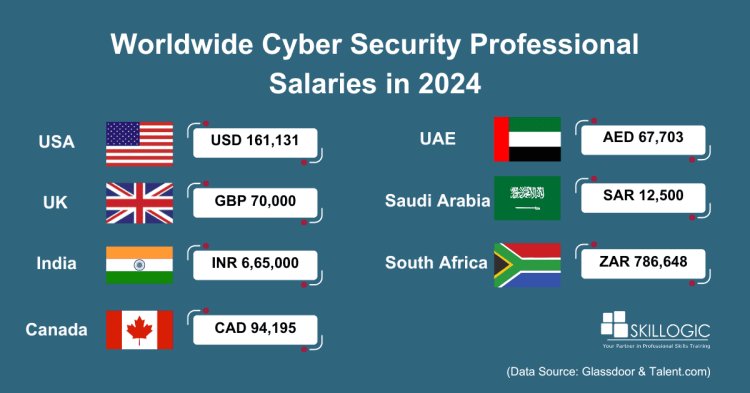Cybersecurity Career Scope in 2024

Cybersecurity has emerged as a critical field in today's digital age, where threats to data and privacy are rampant. According to a recent report by Cybersecurity Ventures, global spending on cybersecurity is expected to exceed $1 trillion from 2021 to 2025. This staggering figure underscores the growing importance of cybersecurity professionals in protecting businesses, governments, and individuals from malicious cyber activities.
Transitioning into 2024, the demand for cybersecurity experts continues to rise, driven by technological advancements and an increase in cyber threats. This blog explores the current landscape of cybersecurity careers, the skills required, industry applications, salary insights, and how aspiring professionals can prepare for this promising field.
Why Pursue a Career in Cybersecurity?
A career in cybersecurity presents continuous challenges, opportunities to safeguard critical information, and a dynamic environment with limitless chances for learning. It involves defending against ever-changing digital threats, ensuring privacy, and bolstering the resilience of global organizations. The effects are immediate and essential in our interconnected world. Pursuing a career in cybersecurity in 2024 offers numerous compelling reasons:
- High Demand: As cyber threats evolve, so does the demand for skilled professionals who can combat these threats. Organizations across sectors are actively seeking cybersecurity experts to safeguard their digital assets.
- Career Growth: The cybersecurity field offers immense opportunities for career growth and advancement. With the rapid digital transformation globally, the need for cybersecurity professionals is projected to continue growing.
- Job Security: Unlike many other industries, cybersecurity professionals enjoy relatively high job security. The constant need for protection against cyber threats ensures a stable demand for qualified individuals.
- Challenging and Rewarding Work: Working in cybersecurity involves tackling complex challenges and staying ahead of cybercriminals. It's a dynamic field that provides a sense of fulfillment through protecting critical information.
Read these articles:
Is Cybersecurity a Good Career?
Cybersecurity offers a promising career path due to increasing digital threats and data breaches globally. Professionals in this field protect sensitive information, develop secure systems, and combat cybercrime. With growing demand across industries, ample opportunities exist for specialists in areas like network security, ethical hacking, and information assurance. Cybersecurity stands out as not only a good but also an excellent career choice for several reasons:
- Lucrative Opportunities: The cybersecurity industry offers competitive salaries and benefits due to the high demand for specialized skills.
- Global Relevance: Cyber threats transcend borders, making cybersecurity a universally relevant field with opportunities worldwide.
- Continuous Learning: The nature of cybersecurity requires professionals to stay updated with the latest technologies and threats, fostering ongoing professional development.
- Variety of Roles: From penetration testers to security analysts and ethical hackers, cybersecurity offers diverse career paths catering to different interests and skill sets.
Transitioning into 2024, the field's growth trajectory remains robust, promising continued opportunities and advancements.
Skills required to Become Cyber Security Professional
Cybersecurity professionals require a blend of technical expertise and strategic thinking to protect digital systems from threats. Skills include proficiency in network security, encryption protocols, incident response, and vulnerability assessment. Critical thinking, problem-solving, and a deep understanding of emerging technologies are essential for mitigating risks and ensuring robust defense strategies. In 2024, succeeding in cybersecurity careers requires a mix of technical expertise and soft skills:
Technical Skills:
- Expertise in network security, cryptography, and secure coding principles.
- Knowledge of operating systems (e.g., Linux, Windows) and familiarity with cloud platforms.
- Ability to use cybersecurity tools such as firewalls, intrusion detection systems (IDS), and vulnerability assessment tools.
Soft Skills:
- Utilizing analytical reasoning and problem-solving abilities to recognize and address security threats.
- Communication skills to collaborate with teams and explain technical concepts to non-technical stakeholders.
- Being meticulous and taking initiative to anticipate upcoming risks.
- Developing these skills through formal education, hands-on experience, and cybersecurity certifications such as CISSP, CEH, or CompTIA Security+ is crucial for career advancement.
Read these articles:
- What is Cyber Security Professional Plus?
- Cyber Security Tips and Best Practices
- What is Phishing? Types of Phishing Attacks
Cyber Security across in Various Industries
In today's interconnected world, where digital transformation has revolutionized every sector, cybersecurity stands as a sentinel guarding against threats that lurk in the digital realm. From healthcare to finance, manufacturing to government, every industry faces unique challenges and vulnerabilities in the realm of cybersecurity. Let's explore how different industries are navigating this complex landscape to secure their digital assets and protect their stakeholders:
- Finance: Banks and financial institutions rely on robust cybersecurity measures to protect customer data and financial transactions.
- Healthcare: With the rise of telemedicine and digital health records, cybersecurity is essential to safeguard patient information.
- Government: Government agencies require cybersecurity professionals to defend national security and critical infrastructure from cyber threats.
- Retail and E-commerce: Online retailers must secure customer payment information and prevent data breaches.
- Technology: Tech companies need cybersecurity experts to protect intellectual property and maintain the integrity of software and hardware products.
Each sector presents unique challenges and opportunities for cybersecurity professionals to make a significant impact.

Worldwide Cyber Security Professional Salaries in 2024
As we step into 2024, the global cybersecurity job market continues to flourish, driven by increasing threats, regulatory requirements, and the digital transformation of businesses worldwide. Cybersecurity salaries vary significantly across regions due to factors such as cost of living, demand-supply dynamics, and local regulatory requirements:
- United States: The average salary for a Cyber Security Engineer is $161,131 per year. (Glassdoor)
- United Kingdom: In the UK, the average salary range for cybersecurity professionals is typically between £33,000 and £70,000. (Glassdoor)
- India: The average salary for a Cyber Security Analyst is ₹665,000 per year. Highly experienced professionals in major cities or specialized roles can earn more. (Glassdoor)
- Canada: The average salary for a cybersecurity analyst is $94,195 per year, with higher salaries often found in larger cities and for more specialized positions. (Indeed)
- United Arab Emirates (UAE): The average salary for Cyber Security is AED 67,703 per month in Dubai. (Glassdoor)
- Saudi Arabia: The typical monthly salary for a Cyber Security Analyst is SAR 12,500, which can vary based on factors such as professional background and industry specialization. (Glassdoor)
- South Africa: The average annual salary for cyber security professionals in South Africa is R 786,648. (Talent.com)
Refer these articles:
- Cyber Security Course Fee in Chennai
- Cyber Security Course Fees in Bangalore
- Cyber Security Course Fee In Hyderabad
How to Prepare for a Cybersecurity Career
Cybersecurity has become a critical field, with professionals in high demand across various industries. Whether you're starting fresh or looking to transition into cybersecurity, here are some essential steps to help you prepare for a successful career in this dynamic and vital field:
- Education: Pursue a degree in cybersecurity, computer science, or related fields. Consider specialized courses and cybersecurity certifications like CISSP, CISM, or OSCP.
- Hands-on Experience: Gain practical experience through internships, cybersecurity competitions (CTFs), or volunteer work.
- Networking: Build connections with cybersecurity professionals through industry events, forums, and LinkedIn.
- Stay Updated: Continuously learn about new cyber threats, technologies, and industry best practices through online courses, webinars, and professional development opportunities.
By proactively developing skills and knowledge, aspiring cybersecurity professionals can position themselves for rewarding careers in the ever-evolving field of cybersecurity.
Cybersecurity careers in 2024 offer promising prospects fueled by increasing cyber threats and digital transformation. With the right skills, education, and certifications, individuals can embark on a fulfilling journey in protecting organizations and individuals from cyber risks. Whether you're considering a career switch or entering the job market for the first time, cybersecurity presents a dynamic and lucrative path forward.
SKILLOGIC offers comprehensive Cyber Security courses designed to equip professionals with advanced skills in protecting digital assets. The programs cover essential topics such as ethical hacking, network security, and incident response, ensuring students gain practical knowledge to combat cyber threats effectively. Additionally, SKILLOGIC provides a range of other courses including project management, IT service management, Business Analytics, and quality management. Each course is crafted to meet industry standards and enhance career prospects in today's competitive job market, making SKILLOGIC a preferred choice for professionals seeking to upgrade their skills across various disciplines.

0
444